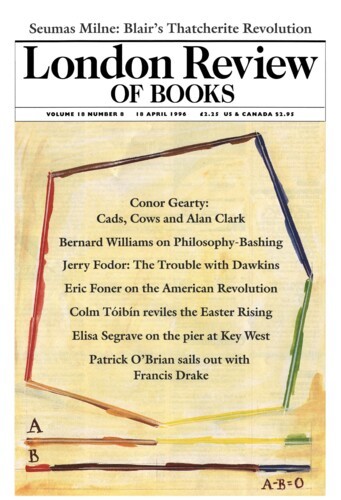Too hard for our kind of mind?
Jerry Fodor, 27 June 1991
Whatever, you may be wondering, became of the mind-body problem? This new collection of Colin McGinn’s philosophical papers is as good a place to find out as any I know of. Published over a period of more than a decade, and drawn together from the usual motley of largely inaccessible academic journals, these essays provide a vivid introduction to current views in the philosophy of mind and to their immediate precursors. Professionals will find, in the earlier publications (which, confusingly, come last in the book), a fascinating record of what happened to the philosophy of mind in England when Davidson and Kripke hit town. Professionals and laity alike will find, in the later publications, an up-to-date, sophisticated and enjoyably tendentious account of the present state of the art.





